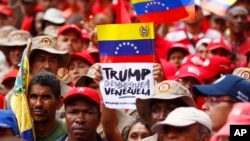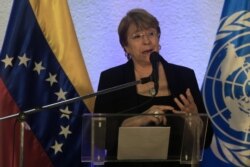The U.N. human rights chief says she is "deeply worried" the new U.S. sanctions on Venezuela's regime are too broad and will make things worse for the suffering population.
Michelle Bachelet said Thursday that there is lots of evidence to show that wide-ranging unilateral sanctions "can end up denying people's fundamental human rights, including their economic rights as well as the right to food and health."
The new U.S. sanctions imposed this week bar American citizens and companies from doing business with President Nicolas Maduro's government.
Bachelet says although the sanctions do not apply to food, clothing and medicine, she fears many businesses and financial institutions will stop all dealings with Venezuela to avoid the risk of violating the sanctions.
Bachelet did not blame one side or the other for the crisis inside Venezuela, but instead called on "all those with influence in Venezuela and in the international community to work together constructively for a political solution ... by putting the interests and human rights of the long-suffering people of Venezuela above all else."
The new sanctions are the toughest step so far in the Trump administration's diplomatic and economic pressure to try to force Maduro to give up power.
Military action also remains on the table, U.S. officials have said.
A drop in world oil prices, corruption and failed policies have wrecked the Venezuelan economy and led to a severe shortage of basic foods, fuel and medicine.
A popular uprising led by Venezuelan opposition leader and National Assembly president Juan Guaido has failed to topple Maduro, who has used force against demonstrators.






